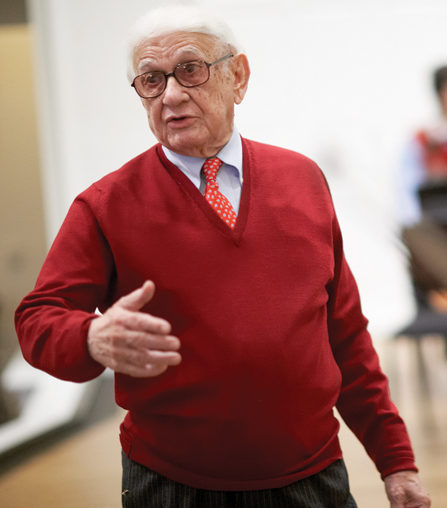
Yale School of Music
Aldo Parisot MUS ’48, a beloved Yale School of Music faculty member and highly esteemed teacher and performer, passed away on Saturday. He was 100.
In a 60-year career in which he became the School of Music’s longest-serving faculty member, Parisot established a legacy through his influential teaching and successful performance career. For decades, cello students from around the globe came to Yale to study with Parisot. His passing comes just six months after the announcement of his retirement from the School of Music.
“I am feeling unbearably sad and heartbroken,” said assistant professor of cello at the School of Music Ole Akahoshi MUS ’95.
In addition to studying under Parisot during his time as a graduate student in the School of Music, Akahoshi served as the only other cello professor teaching alongside Parisot at the School of Music for the past 21 years.
Akahoshi said that he has “the deepest gratitude towards Mr. Parisot for his musical, artistic, emotional, philosophical and paternal guidance; unconditional love; and his limitless friendship” and added that Parisot’s “inspiration and spirit is irreplaceable and will be carried in our hearts forever.”
A Brazilian-born cellist, Parisot began his music career at age 7 and made his professional debut at age 12. Soon after, Parisot joined the Brazilian Symphony Orchestra and served as principal cellist. While studying at the Yale School of Music, Parisot received critical acclaim for his United States debut with the Boston Symphony Orchestra at Tanglewood in Lenox, Massachusetts. His first European tour began the following year.
In the following decades, Parisot appeared in some of the world’s most prestigious concert halls, performing and premiering cello concertos with orchestras in New York, Berlin, London and Vienna.
Before joining the School of Music’s faculty in 1958, Parisot held faculty positions at The Juilliard School, Peabody Conservatory, Mannes College of Music and the New England Conservatory. Today, many of his students hold positions in leading orchestras around the world — a testament to his influential teaching. One former student, Carter Brey MUS ’79, currently serves as principal cello of the New York Philharmonic.
“He certainly had a huge arsenal of ideas and advice that he so generously gave to his students for decades and decades,” said Boston Symphony Orchestra cellist Owen Young ’86 MUS ’87. “He had such a strong, strong will — a conviction that I thought to myself: He will be teaching as long as he possibly can, and he will live a long life just from his sheer willpower.”
Young said that when he was a student, he recalls thinking that Parisot “will live and teach forever.”
Many of Parisot’s students have gone on to lead successful teaching careers as well, passing on Parisot’s unique pedagogy to new generations of cellists.
“He was a master teacher,” said Ralph Kirshbaum ’68, a former student of Parisot who currently serves as professor of cello at the University of Southern California Thornton School of Music. “That means not only was he someone who was well versed in all things cello technique and so forth, but he was a wonderful instinctive psychologist with his students.”
Kirshbaum said that Parisot could “read his students well” and knew when to step in and apply pressure and when to observe and encourage. Kirshbaum said that many of the principles he teaches his own students — such as mastering the cello’s fingerboard and developing technique in the left hand — stem from Parisot’s pedagogy.
Kirshbaum said his relationship with Parisot evolved from a teacher-student relationship into a friendship.
“I am infinitely grateful for that, and this was someone who I really cared about deeply,” said Kirshbaum. “I mean, I loved Aldo Parisot. He was a very important part of my life.”
School of Music visiting professor of cello Paul Watkins said that “even for a 100-year-old man, it was a shock to hear that news.” He added that “it was very moving to meet such a great figure in the world of music and particularly in the world of cello playing.” Watkins emphasized that Parisot “didn’t produce cookie-cutter cellists — he nurtured the individual.”
A former student of Parisot and current performer and professor Inbal Megiddo ’98 MUS ’01 MUS ’02 said that Parisot was “so much more than a teacher — he was a friend, and you always knew he was there to fight for you for what you needed.”
“Everywhere that I go in my career, I meet his students, and a lot of times you can tell who his students are just by the way they play,” Megiddo added.
Brinton Smith, principal cellist of the Houston Symphony and associate professor of cello at Rice University, said that “the legacy of [Parisot’s] teaching over many decades made Aldo perhaps the most influential cellist of his generation, beloved in the cello community and a loss that we all feel deeply.” He emphasized the fact that “nearly every professional U.S. cellist studied with Aldo or with a student of Aldo’s at some point in their career.”
In addition to teaching cello students, Parisot led the Grammy-nominated ensemble Yale Cellos since its formation in 1983. The group gained international renown following the releases of numerous award-winning CDs and has performed around the world in venues including Carnegie Hall’s Weill Recital Hall.
According to a statement by School of Music Dean Robert Blocker, the Parisot family requests that memorial gifts be directed to the Yale Cellos Fund at the Yale School of Music.
Allison Park | allison.park@yale.edu







